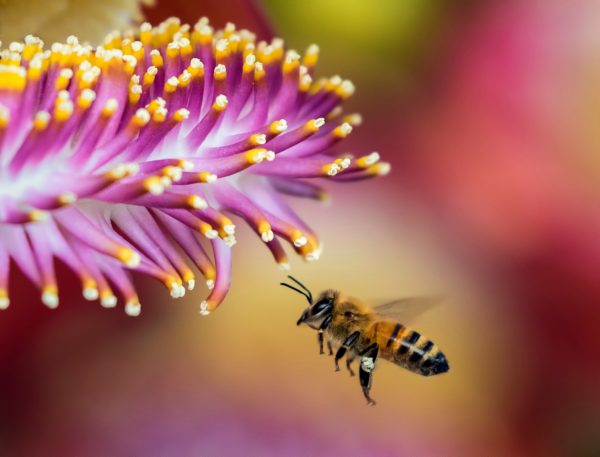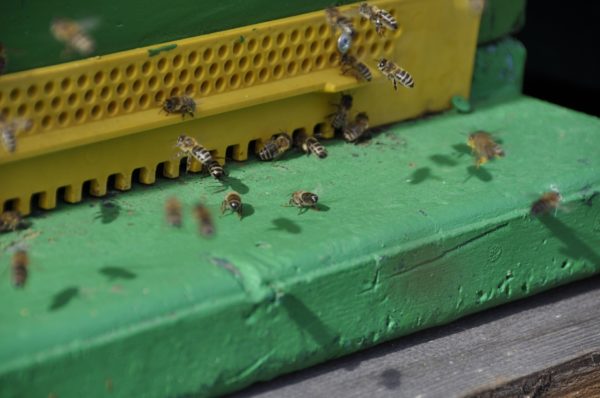
Bee Good Couscous to Bees
After thoughtful consideration, we’ve decided to discontinue Bee Good Couscous for 2017. This product contains bee pollen, which comes from the pollen of plants collected by honeybees. Honeybees have been dying off in record number for more than a decade because of human interference. In good consciousness, we will no longer purchase products coming from bees. Bee Good Couscous is on sale to make room for new products.
What is Bee Pollen
Bees collect pollen in sacs that are attached to their legs. During the collection process, the bees mix the pollen with nectar and their own digestive enzymes. These three components – pollen, nectar, and digestive enzymes – are what constitute bee pollen. After the bees collect the pollen, it is brought to the hive and packed in honeycomb cells where it will be used as a protein source for the bee colony. [1]
Bee Pollen & Human Health
Bee pollen is associated with increased energy and stamina and is widely consumed by athletes worldwide. It contains a high percentage of protein, carbohydrate sugars, beneficial vitamins, minerals, and phenolic compounds. Eating local bee pollen can also build resistance to seasonal allergies. [3]
A rarely mentioned disadvantage of consuming bee pollen is the amount of pesticide present, including the pollen taken from areas where crops are untreated. Samples take from researchers at The Ohio State University found 31 pesticides in pollen from an untreated cornfield. [4]
Not only do pesticides pose a significant risk for the survival of honey bees, but they also may pose health risks for people ingesting the contaminated pollen. Most alarmingly, the extraction of bee pollen for human use causes stress to honeybees.
Collecting Bee Pollen

Beekeepers install a screen trap, which the bees must enter to access the hive. These screens scrape off the pollen from the legs of the bees as they enter. While these filters work well for extracting pollen, it can also rip off the bees’ limbs. And because we remove their food source, it necessitates the bees having to forage for more food. This, in turn, causes additional strain on their already weakened health. Consequently, harvesting any bee product often comes at the expense of the health of the bee.
Honeybee populations are declining at an alarming rate, largely due to a disease is known as Colony Collapse Disorder (CCD). In the US, there has been a loss of 30 percent per year since 2006, leaving an insufficient population of bees for pollination. [2]
CCD is caused by numerous factors, including parasites, pesticide use, pollution, mono-cropping, and malnutrition.
Bees Need our Help
Without bees, our health will suffer. Bees pollinate one in every three bites of food we eat, everything from almonds to zucchinis. If the trend continues, it will jeopardize the production of food that sustains human life.
What you can do to help:
- Plant flowers that attract bees. This will help counter malnutrition.
- Support responsible farming by buying organic, whole foods grown locally and sustainably.
- Don’t use toxic chemicals such as pesticides, fertilizers, and herbicides on your lawns or gardens.
- If you live in an urban area, install a humane beehive and leave it alone. There is evidence that bees thrive in urban environments where there tends to be more plant biodiversity and less pesticide use.
- Educate yourself on Colony Collapse Disorder.
- Sign this worldwide petition to stop the use of neonicotinoids and other bee-killing pesticides.
Marla Spivak’s Ted Talk on “Why bees are disappearing.”
Sources:
[1] Komosinska-Vassev, K., Olczyk, P., Kaźmierczak, J., Mencner, L., & Olczyk, K. (2015). Bee Pollen: Chemical Composition and Therapeutic Application. Evidence-Based Complementary And Alternative Medicine, 2015, 1-6. doi:10.1155/2015/297425
[2] Fact Sheet: The Economic Challenge Posed by Declining Pollinator Populations. (2014). whitehouse.gov. from https://www.whitehouse.gov/the-press-office/2014/06/20/fact-sheet-economic-challenge-posed-declining-pollinator-populations
[3] Komosinska-Vassev, K., Olczyk, P., Kaźmierczak, J., Mencner, L., & Olczyk, K. (2015). Bee Pollen: Chemical Composition and Therapeutic Application. Evidence-Based Complementary And Alternative Medicine, 2015, 1-6. doi:10.1155/2015/297425
[4] Honeybees pick up ‘astonishing’ number of pesticides via non-crop plants. (2017). Phys.org. from http://phys.org/news/2016-05-honeybees-astonishing-pesticides-non-crop.html